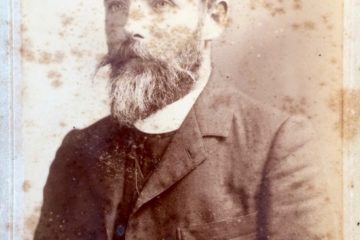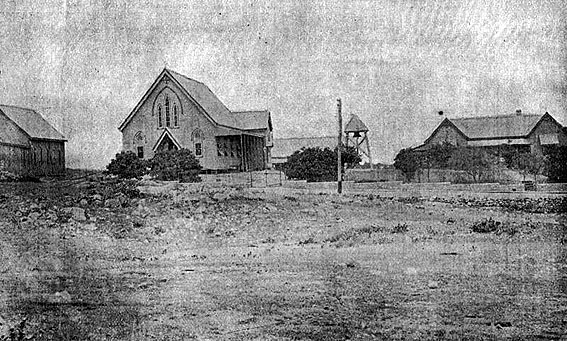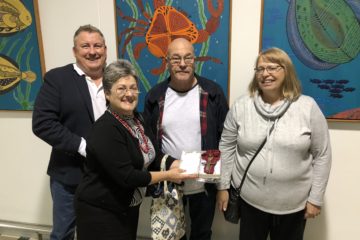Bound for New Zealand
CANON GARLAND
FAREWELL GATHERINGS.
CANON Garland [ David John Garland ], who during his residence in Queensland has made his influence felt in the public life of Brisbane, and the State beyond, was tendered a civic farewell yesterday [ 31 July 1912 ], when a member of representative men met in the Town Hall.
The Mayor of Brisbane (Alderman A.J. Raymond) [ Alfred John Raymond, pictured above in “Queenslanders As We See ’em, 1916”, published by the Newspaper Cartoonists’ Association of Queensland, Brisbane ] was in the chair, and others present included:
- Hon. F. T. Brentnall, M.L.C.
[ Frederick Thomas Brentnall ], - Aldermen J.E. Burke (Mayor of South Brisbane)
[ John Edward Burke ], - H.J. Diddams, C.M.G.
[ Henry John Charles Diddams ], - J. Crase
[ John Crase ], - J. W. Hetherington
[ John William Hetherington ], - G. Down
[ George Down ], - C.M. Jenkinson
[ Charles Moffatt Jenkinson, State Member for Fassifern and Federal Member for Wide Bay], - F.C. Dent
[ Frederick Christopher Dent ], - Mr James Allan, M.L.A.
[ the State Member for Kurilpa ], - Canon Jones
[ Thomas Jones ], - the Reverends Osborne Lilley
[ William Osborne Lilley ], - G.E. Rowe
[ George Edwards Rowe ], - J.C. Gibson
[ Joseph Charles Gibson ], - Messrs. W.H. Ryder, I.S.O.,
[ William Henry Ryder ], - J.J. Kingsbury
[ John James Kingsbury ], - Major Simmons
[ John Simmons ] - and Major Sankey
[ James Richard Sankey ].
The Archbishop of Brisbane (Dr. Donaldson) [ St Clair George Alfred Donaldson ] arrived at the close of the proceedings, having been unavoidably detained. Apologies for absence were received from Sir Arthur Morgan, Hon. E.J. Stevens [ Ernest James Stevens ], M.L.C., Hon. J.G. Appel [ John George Appel ], Brigadier Harris [ Alfred James Stewart Harris, Salvation Army ], and Mr. P.J. McDermott, I.S.O. [ Peter Joseph McDermott ].
The Mayor observed that they were saying farewell to a gentleman who had proved his citizenship. Looking at it from whatever standpoint one might, one could not fail to conceive a great respect for the energetic, able and ready way in which Canon Garland had ever devoted himself to every movement where his assistance was needed, not forgetting the Coronation festivities.
All would regret the loss to Queensland of such a man. (Hear, hear.)
The necessities of Queensland at the present time were such that the State could not afford to part with him. (Applause.)
The remarks of the Mayor were cordially supported by Alderman Down, Canon Jones, Hon. T.F. Brentnall, Alderman Diddams, Messrs. Ryder and Kingsbury, Alderman Crase, Rev. Osborne Lilley, Alderman Burke, Jenkinson and Rev. G.E. Rowe, all of whom testified to the dauntless courage, pertinacity and determination of their guest.
Mr. Kingsbury observed that he admired him for the fact that he acted as a citizen and not as a nominee of ecclesiastical authority.
Alderman Jenkinson said that, although the Dominion might be a cold country, the Canon would start such a fire in New Zealand that it would soon become “a jolly warm place”.
All present joined in the hope that the Canon might soon return to assist the public life of the State.
Canon Garland, in acknowledging the kindness shown him, said he personally thought the relations between Church and State in this community were the best for the State, and equally best for the various Churches.
He did not believe in the Church gaining dominance in State affairs, but he did think that the State suffered very much when it took such action as alienated the Church from it. (Hear, hear.)
The Churches and State should work hand in hand for the benefit of the community and it was only when they did so that they were fulfilling their highest functions.
He thought too that municipal government did not always realise how much it could do for the people, for though Parliament might he the supreme authority, in between there came the municipal government which seemed to touch the lives of the people more intimately than did Parliament.
A farewell conversazione was tendered by the parishioners of Holy Trinity Church, Merton-road, last evening to Canon Garland, Mrs Garland and Master Garland, upon to their departure for New Zealand where Canon Garland goes in connection with Bible in Schools work.
The gathering was largely attended, and during the evening occasion was taken to present to Canon Garland a purse of sovereigns.
Archdeacon Le Fanu [ Henry Frewen Le Fanu ] presided at the opening, but had to leave early to attend another function. Others present included the Rev. and Mrs. G.E. Rowe, Captain Peirson [ Arthur Thomas Peirson ], Messrs. T.H. Ware [ Thomas Henry Ware ], J. Ward, French, O. Coey [ Owen Ellwood Coey ] and D. McGee, Mesdames Weedon, Perrett, G.W. Bennett, Bunce, Smith, Slater, Blackford, Edwards, Bradford, Francis, Coey, Cheshire, Draycott, Withers, Mackrell, Owens, Draycott, McEvoy, Misses Tilley, Ward, Francis, Mrs. and Miss Faulkner, Mrs. Woodward, Mrs J.A. Philp, Miss Philp, Mrs. Shattock, and Miss Halstead.
An apology was received from Mr. H. Weightman, who was absent through illness.
Archdeacon Le Fanu spoke of the great loss which Canon Garland’s departure meant in the larger public sense, but to those in the parish there was a deep sense of personal and family loss.
With all his work, it had been marvellous to observe how he had found the tune to stir the parish into active life.
They could indeed thank God for all he had been enabled to do for them in the last five years. (Applause.)
He knew that the Archbishop would endorse all that could be said of Canon Garland’s work in the parish, and were it possible His Grace would have been very glad to have attended that evening.
Mr. Ware, the People’s Warden, said the people of the parish would gladly have deferred such a parting for many years, and when it was decided upon they had feared it would mean disaster.
However, by the arrangement which had been agreed to by the Archbishop, and with the co-operation of the parishioners and Parochial Council, he hoped they would pull through.
They felt sure that in New Zealand Canon Garland would accomplish a great national work, and return to them victorious. (Applause.)
Purses of sovereigns were then presented to Canon Garland, Mrs. Garland and Master David Garland, also a special gift to Mrs. Garland from the Bible class, and a brooch from the Women’s Guild.
The Rev. G.E. Rowe [ George Edwards Rowe ] said that with the departure of Canon Garland they would miss a most familiar and popular presence.
The Bible in Schools League in Queensland was losing an untiring, courageous, and – thank God – most successful leader.
But as much as they would all miss him, as a citizen, it would not compare with the less to the parish of a most faithful and godly pastor.
Canon Garland’s devotion to the work of the League had been unparalleled, but even that devotion had not interfered with his duty to his parish, his attention to the sick and those who had needed his ministrations.
Mr. Rowe touched upon the success which had marked Canon Garland’s work in Western Australia and in Queensland.
God had now called him most unmistakably to New Zealand, and he held that for one man to put the Bible into the hands of the school children of those three lands was a more glorious achievement than any victory on the battle field. (Applause.)
Mr. Coey, speaking as a member of the Parochial Council, said that in Canon Garland they felt they were losing a man in the fullest sense.
He had made the parish a happy family and had left them in a unique financial position, with church, hall and rectory buildings in sound condition a new organ, and no debt. (Hear, hear.)
He had ever been ready at the call of duty, not only to his own parishioners, but to any who needed his help.
The work he had done in Queensland, and was called to do in New Zealand, in placing the Bible in the hands of all school children would be the greatest factor in building up a sound, moral, Christian nation. (Applause.)
Canon Garland, who was deeply affected, said that kind reference had been made to his work outside the parish, but he had always felt that the parish was his home.
People outside had, perhaps, known him only as a fighter and a zealot in certain directions, but all that was more or less the call of circumstance – his heart had ever been in the work of his parish and the needs of his people.
Whatever credit might be afforded him for the work done outside, the major part was due to them for the generous manner in which they had helped him.
Their sacrifice, however, had been blessed their property was in good older and clear of debt, they had a credit to current account, and a handsome sum towards a new building.
On the spiritual side, their sacrifice had brought them nearer to God and they had been able to feel that their worship was indeed the opening of the door to heaven.
In leaving them he had felt that he must do the obviously right thing.
A parishioner had said: “If you were called to a bishopric we could not say no, and you are called to something infinitely greater.”
He appealed to them to stand by their parish as though he were with them, and added: “Let my closing words be those which can be best understood by the earnest communicants of our Church – ‘the Body and the blood are given and shed for you’.”
– from page 8 of “The Brisbane Courier” of 1 August 1912.


